倒装句经典例题(word)
- 格式:doc
- 大小:96.00 KB
- 文档页数:12
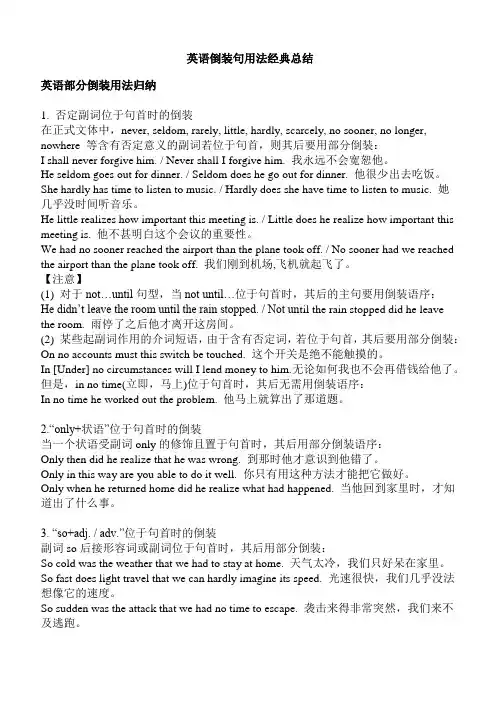
英语倒装句用法经典总结英语部分倒装用法归纳1. 否定副词位于句首时的倒装在正式文体中,never, seldom, rarely, little, hardly, scarcely, no sooner, no longer, nowhere 等含有否定意义的副词若位于句首,则其后要用部分倒装:I shall never forgive him. / Never shall I forgive him. 我永远不会宽恕他。
He seldom goes out for dinner. / Seldom does he go out for dinner. 他很少出去吃饭。
She hardly has time to listen to music. / Hardly does she have time to listen to music. 她几乎没时间听音乐。
He little realizes how important this meeting is. / Little does he realize how important this meeting is. 他不甚明白这个会议的重要性。
We had no sooner reached the airport than the plane took off. / No sooner had we reached the airport than the plane took off. 我们刚到机场,飞机就起飞了。
【注意】(1) 对于not…until句型,当not until…位于句首时,其后的主句要用倒装语序:He didn’t leave the room until the rain stopped. / Not un til the rain stopped did he leave the room. 雨停了之后他才离开这房间。
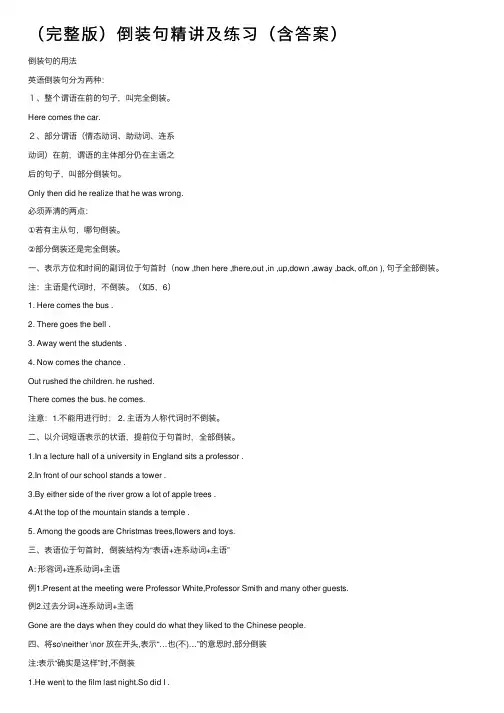
(完整版)倒装句精讲及练习(含答案)倒装句的⽤法英语倒装句分为两种:1、整个谓语在前的句⼦,叫完全倒装。
Here comes the car.2、部分谓语(情态动词、助动词、连系动词)在前,谓语的主体部分仍在主语之后的句⼦,叫部分倒装句。
Only then did he realize that he was wrong.必须弄清的两点:①若有主从句,哪句倒装。
②部分倒装还是完全倒装。
⼀、表⽰⽅位和时间的副词位于句⾸时(now ,then here ,there,out ,in ,up,down ,away ,back, off,on ), 句⼦全部倒装。
注:主语是代词时,不倒装。
(如5,6)1. Here comes the bus .2. There goes the bell .3. Away went the students .4. Now comes the chance .Out rushed the children. he rushed.There comes the bus. he comes.注意:1.不能⽤进⾏时; 2. 主语为⼈称代词时不倒装。
⼆、以介词短语表⽰的状语,提前位于句⾸时,全部倒装。
1.In a lecture hall of a university in England sits a professor .2.In front of our school stands a tower .3.By either side of the river grow a lot of apple trees .4.At the top of the mountain stands a temple .5. Among the goods are Christmas trees,flowers and toys.三、表语位于句⾸时,倒装结构为“表语+连系动词+主语”A: 形容词+连系动词+主语例1.Present at the meeting were Professor White,Professor Smith and many other guests.例2.过去分词+连系动词+主语Gone are the days when they could do what they liked to the Chinese people.四、将so\neither \nor 放在开头,表⽰“…也(不)…”的意思时,部分倒装注:表⽰“确实是这样”时,不倒装1.He went to the film last night.So did I .2.You must finish your work ,so must I .3.She is interested in the story ,so am I .4.He didn’t turn up .Neither did his brother .5.His mother told him not to go to the film .So he did.五、在if 条件句中,通常可以省略if ,⽽将从句倒装条件:在if 条件句,必须含有系动词were, 助动词had 和情态动词should1.Were he younger(=If he were younger ),he would learn skating .2.Should they forget (=If they should forget ) to bring a map with them ,they would get lost in the woods .3.Had they realized (=If they had realized ) how important the task was ,they wouldn’t have refused to accept .4.Were I you ,I would help her .六、否定词或半否定词(never .little ,seldom ,not ,nowhere ,scarely ,few ,by no means ,at no time )位于句⾸,应部分倒装1.Never have I been there .2.Little did I know about it .3.Seldom did she come late to school .4.Not a single mistake did he make .5.By no means should you buy that kind of car .七、以not until ,no sooner …than , hardly …when ,not only …but also 所引导的状语放在句⾸时,需要部分倒装1.Not until 10’clock will the library open .2.No sooner had I gone out than he came to see me .3.Hardly had the train arrived when I ran to meet my friend.4.Not only does she speak English but also she follows the British way of life .⼋、only 及其修饰的状语位于句⾸时,后⾯的句⼦部分倒装。
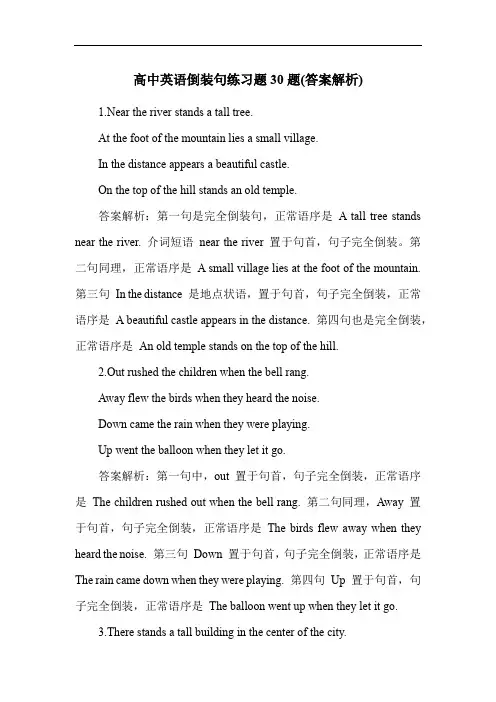
高中英语倒装句练习题30题(答案解析)1.Near the river stands a tall tree.At the foot of the mountain lies a small village.In the distance appears a beautiful castle.On the top of the hill stands an old temple.答案解析:第一句是完全倒装句,正常语序是 A tall tree stands near the river. 介词短语near the river 置于句首,句子完全倒装。
第二句同理,正常语序是 A small village lies at the foot of the mountain. 第三句In the distance 是地点状语,置于句首,句子完全倒装,正常语序是A beautiful castle appears in the distance. 第四句也是完全倒装,正常语序是An old temple stands on the top of the hill.2.Out rushed the children when the bell rang.Away flew the birds when they heard the noise.Down came the rain when they were playing.Up went the balloon when they let it go.答案解析:第一句中,out 置于句首,句子完全倒装,正常语序是The children rushed out when the bell rang. 第二句同理,Away 置于句首,句子完全倒装,正常语序是The birds flew away when they heard the noise. 第三句Down 置于句首,句子完全倒装,正常语序是The rain came down when they were playing. 第四句Up 置于句首,句子完全倒装,正常语序是The balloon went up when they let it go.3.There stands a tall building in the center of the city.Here comes the bus.There goes the bell.Here are some books.答案解析:第一句不是完全倒装句,是there be 句型。
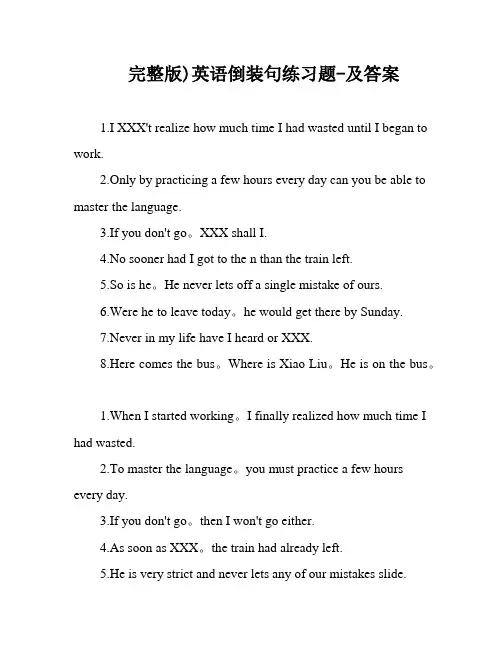
完整版)英语倒装句练习题-及答案1.I XXX't realize how much time I had wasted until I began to work.2.Only by practicing a few hours every day can you be able to master the language.3.If you don't go。
XXX shall I.4.No sooner had I got to the n than the train left.5.So is he。
He never lets off a single mistake of ours.6.Were he to leave today。
he would get there by Sunday.7.Never in my life have I heard or XXX.8.Here comes the bus。
Where is Xiao Liu。
He is on the bus。
1.When I started working。
I finally realized how much time I had wasted.2.To master the language。
you must practice a few hours every day.3.If you don't go。
then I won't go either.4.As soon as XXX。
the train had already left.5.He is very strict and never lets any of our mistakes slide.6.If he were to leave today。
he could arrive by Sunday.7.I have XXX.8.The bus is coming。
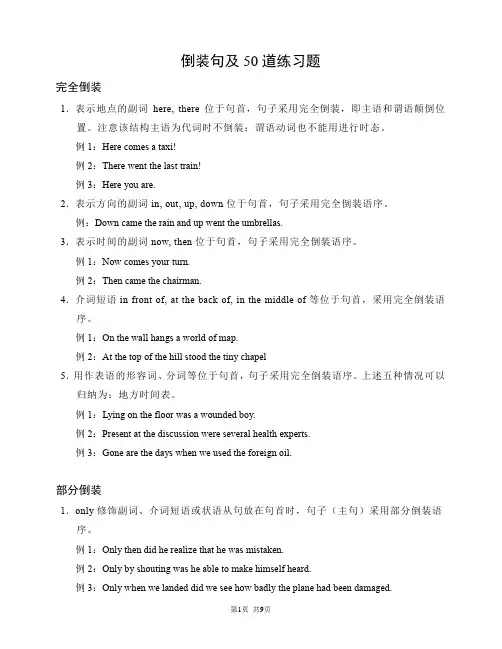
倒装句及50道练习题完全倒装1.表示地点的副词here, there位于句首,句子采用完全倒装,即主语和谓语颠倒位置。
注意该结构主语为代词时不倒装;谓语动词也不能用进行时态。
例1:Here comes a taxi!例2:There went the last train!例3:Here you are.2.表示方向的副词in, out, up, down位于句首,句子采用完全倒装语序。
例:Down came the rain and up went the umbrellas.3.表示时间的副词now, then位于句首,句子采用完全倒装语序。
例1:Now comes your turn.例2:Then came the chairman.4.介词短语in front of, at the back of, in the middle of等位于句首,采用完全倒装语序。
例1:On the wall hangs a world of map.例2:At the top of the hill stood the tiny chapel5.用作表语的形容词、分词等位于句首,句子采用完全倒装语序。
上述五种情况可以归纳为:地方时间表。
例1:Lying on the floor was a wounded boy.例2:Present at the discussion were several health experts.例3:Gone are the days when we used the foreign oil.部分倒装1.only修饰副词、介词短语或状语从句放在句首时,句子(主句)采用部分倒装语序。
例1:Only then did he realize that he was mistaken.例2:Only by shouting was he able to make himself heard.例3:Only when we landed did we see how badly the plane had been damaged.2.so/such….that…句型位于句首时,主句部分采用倒装语序。
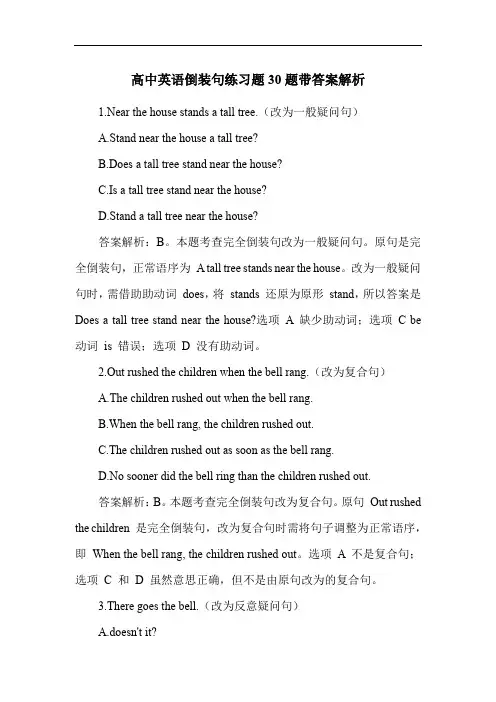
高中英语倒装句练习题30题带答案解析1.Near the house stands a tall tree.(改为一般疑问句)A.Stand near the house a tall tree?B.Does a tall tree stand near the house?C.Is a tall tree stand near the house?D.Stand a tall tree near the house?答案解析:B。
本题考查完全倒装句改为一般疑问句。
原句是完全倒装句,正常语序为 A tall tree stands near the house。
改为一般疑问句时,需借助助动词does,将stands 还原为原形stand,所以答案是Does a tall tree stand near the house?选项A 缺少助动词;选项C be 动词is 错误;选项D 没有助动词。
2.Out rushed the children when the bell rang.(改为复合句)A.The children rushed out when the bell rang.B.When the bell rang, the children rushed out.C.The children rushed out as soon as the bell rang.D.No sooner did the bell ring than the children rushed out.答案解析:B。
本题考查完全倒装句改为复合句。
原句Out rushed the children 是完全倒装句,改为复合句时需将句子调整为正常语序,即When the bell rang, the children rushed out。
选项A 不是复合句;选项C 和D 虽然意思正确,但不是由原句改为的复合句。
3.There goes the bell.(改为反意疑问句)A.doesn't it?B.does it?C.isn't it?D.is it?答案解析:A。
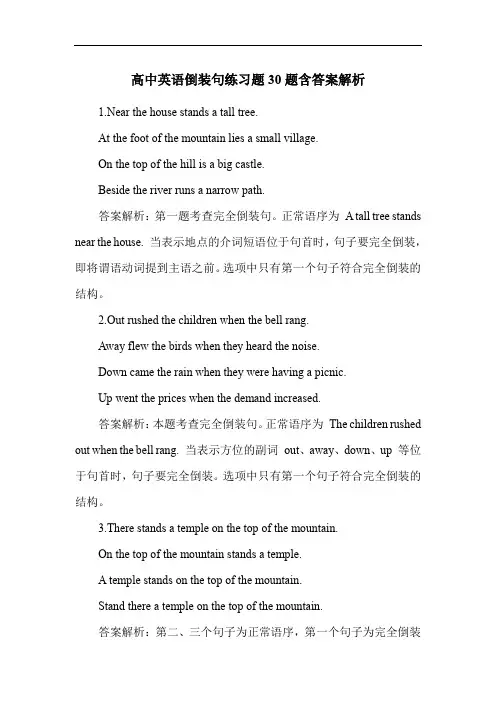
高中英语倒装句练习题30题含答案解析1.Near the house stands a tall tree.At the foot of the mountain lies a small village.On the top of the hill is a big castle.Beside the river runs a narrow path.答案解析:第一题考查完全倒装句。
正常语序为 A tall tree stands near the house. 当表示地点的介词短语位于句首时,句子要完全倒装,即将谓语动词提到主语之前。
选项中只有第一个句子符合完全倒装的结构。
2.Out rushed the children when the bell rang.Away flew the birds when they heard the noise.Down came the rain when they were having a picnic.Up went the prices when the demand increased.答案解析:本题考查完全倒装句。
正常语序为The children rushed out when the bell rang. 当表示方位的副词out、away、down、up 等位于句首时,句子要完全倒装。
选项中只有第一个句子符合完全倒装的结构。
3.There stands a temple on the top of the mountain.On the top of the mountain stands a temple.A temple stands on the top of the mountain.Stand there a temple on the top of the mountain.答案解析:第二、三个句子为正常语序,第一个句子为完全倒装句,将地点状语on the top of the mountain 置于句首,谓语动词stands 提到主语 a temple 之前。
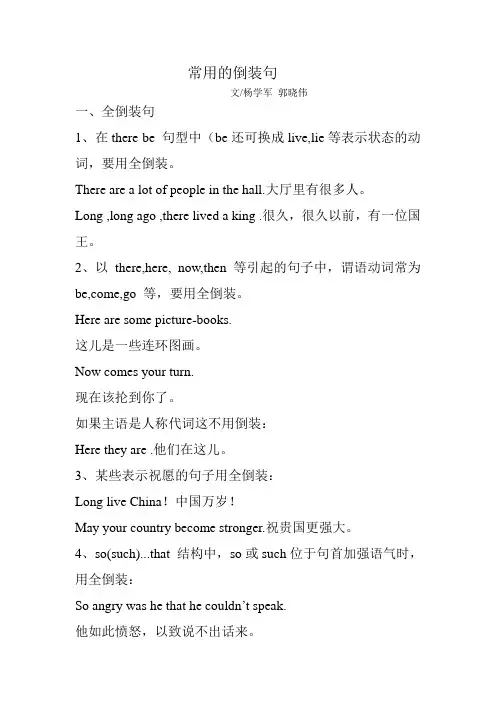
常用的倒装句文/杨学军郭晓伟一、全倒装句1、在there be 句型中(be还可换成live,lie等表示状态的动词,要用全倒装。
There are a lot of people in the hall.大厅里有很多人。
Long ,long ago ,there lived a king .很久,很久以前,有一位国王。
2、以there,here, now,then 等引起的句子中,谓语动词常为be,come,go 等,要用全倒装。
Here are some picture-books.这儿是一些连环图画。
Now comes your turn.现在该抡到你了。
如果主语是人称代词这不用倒装:Here they are .他们在这儿。
3、某些表示祝愿的句子用全倒装:Long live China!中国万岁!May your country become stronger.祝贵国更强大。
4、so(such)...that 结构中,so或such位于句首加强语气时,用全倒装:So angry was he that he couldn’t speak.他如此愤怒,以致说不出话来。
5、在in,out,aways,off,up,down 等副词开头的句中,为了使情景更生动,用全倒装:Up went the arrow into the air.嗖地一声,箭射上了天。
注:主语是代词时,则不用倒装:Away they went.他们走了。
6、整个(或部分)直接引语置于名词充当的主语前时,用全倒装:“They must be in the fields now.”thought Mr Li.“他们准是下地了,“李先生想。
注:主语是人称代词时,多不用倒装:“What do you want?”he asked.“你要什么?”他问。
7、为保持句子平衡,或使上下文衔接更紧,可把介词短语、形容词、副词或分词提到句首,引起全倒装:On the ground lay an old sick goat,which had gone into the cave to die.地上躺着一只有病的老山羊,它是到洞里去等死的。
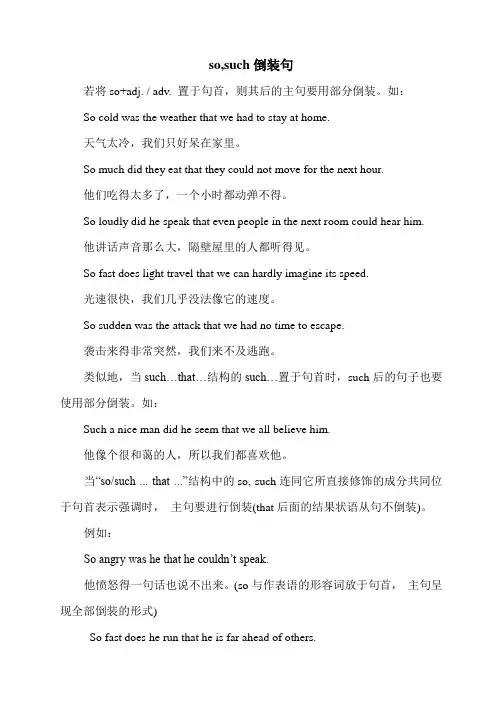
so,such倒装句若将so+adj. / adv. 置于句首,则其后的主句要用部分倒装。
如:So cold was the weather that we had to stay at home.天气太冷,我们只好呆在家里。
So much did they eat that they could not move for the next hour.他们吃得太多了,一个小时都动弹不得。
So loudly did he speak that even people in the next room could hear him.他讲话声音那么大,隔壁屋里的人都听得见。
So fast does light travel that we can hardly imagine its speed.光速很快,我们几乎没法像它的速度。
So sudden was the attack that we had no time to escape.袭击来得非常突然,我们来不及逃跑。
类似地,当such…that…结构的such…置于句首时,such后的句子也要使用部分倒装。
如:Such a nice man did he seem that we all believe him.他像个很和蔼的人,所以我们都喜欢他。
当“so/such ... that ...”结构中的so, such连同它所直接修饰的成分共同位于句首表示强调时,主句要进行倒装(that后面的结果状语从句不倒装)。
例如:So angry was he that he couldn’t speak.他愤怒得一句话也说不出来。
(so与作表语的形容词放于句首,主句呈现全部倒装的形式)So fast does he run that he is far ahead of others.他跑得如此快,以至于远远领先于其他人。
(so与修饰谓语run的副词fast放于句首,主句呈现部分倒装的形式)To such an extent do the parents love their son that they have tried to satisfy every demand of his.父母俩爱子爱到了如此程度,以至于尽量满足他的任何要求。
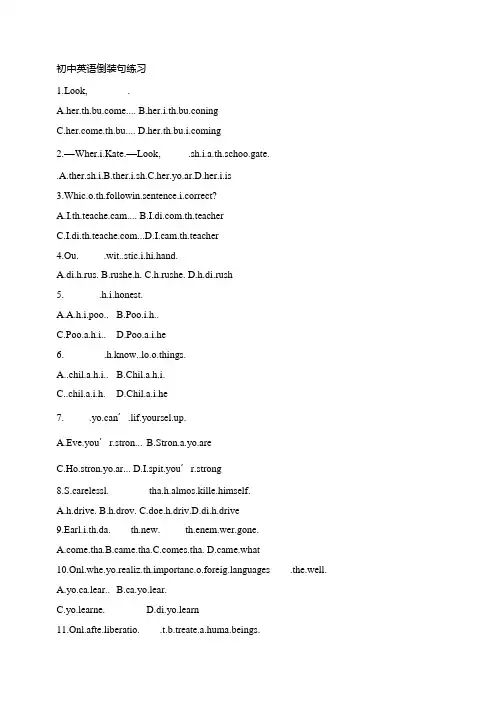
初中英语倒装句练习1.Look,________.e....B.her.i.th.bu.coninge.th.bu....ing2.—Wher.i.Kate.—Look, _____.sh.i.a.th.schoo.gate..A.ther.sh.i.B.ther.i.sh.C.her.yo.ar.D.her.i.is3.Whic.o.th.followin.sentence.i.correct?A.I.th.teache.cam.....th.teacher...D.I.cam.th.teacher4.Ou._____.wit..stic.i.hi.hand.A.di.h.rus.B.rushe.h.C.h.rushe.D.h.di.rush5._______.h.i.honest.A.A.h.i.poo..B.Poo.i.h..C.Poo.a.h.i..D.Poo.a.i.he6.________.h.know..lo.o.things.A..chil.a.h.i..B.Chil.a.h.i.C..chil.a.i.h.D.Chil.a.i.he7._____.yo.can’.lif.yoursel.up.A.Eve.you’r.stron...B.Stron.a.yo.areC.Ho.stron.yo.ar...D.I.spit.you’r.strong8.S.carelessl.________tha.h.almos.kille.himself.A.h.drive.B.h.drov.C.doe.h.driv.D.di.h.drive9.Earl.i.th.da.____th.new._____th.enem.wer.gone.e.tha.B.came.tha.es.tha.D.came.whatnguages____.the.well.A.yo.ca.lear..B.ca.yo.lear.C.yo.learne.D.di.yo.learn11.Onl.afte.liberatio.____.t.b.treate.a.huma.beings.A.di.the.begi.B.the.ha.begu.C.the.di.begi.D.ha.the.begun12.No.onl.___.t.sta.a.home.bu.h.wa.als.forbidde.t.se.hi.friends.A.h.wa.forcin..B.h.wa.force..C.wa.h.forcin.D.wa.h.forced13.No.unti.hi.fathe.wa.ou.o.prison___.t.school.A.ca.Joh.g.B.Joh.ca.g.C.coul.Joh.g.D.Joh.coul.go14.Neve.befor.____.see.suc..stupi.man.A.a.....B.wa....C.hav..D.shal.I15.Rarel.____suc..sill.thing.A.hav..hear.o..B..hav.hear.ofC.a..hear.o.D.ha..hear.of16.Littl.____.abou.hi.ow.healt.thoug.h.wa.ver.ill.A.h.care.B.di.h.car.C.doe.h.careD.h.cares17.Onl.whe.____.i.th.afternoo. ____.abl.t.leave.A.th.matc.wa.over.the.wer.B.wa.th.matc.over.wer.theyC.wa.th.matc.over.the.wereD.th.matc.wa.over.wer.they18.Hardl.___.dow.___.h.steppe.in.A.ha..sat.tha..B..ha.sat.whe.C.ha..sat.the..D.ha..sat.when19.N.soone._____aslee.tha.sh.hear..knoc.a.th.door.A.sh.ha.falle..B.ha.sh.falle.C.sh.ha.fel.D.ha.sh.fell20.Sh.di.no.se.Smith.________.A.Neithe.di...B.No.didn’...C.Neithe..di..D.S.didn’.I21.I.fron.o.th.farmhous.______...peasan.boyi..peasan.boyyD.di..peasan.bo.lie22.—Yo.ough.t.hav.give.the.som.advice..—_____, but who cared what I said ?A.S.ough.yo.B.S..ough.C.S.di.yo.D.S..did23.—I.wa.ho.yesterday. —_____.A.I.wa.so.B.S.wa.it.C.S.i.was.D.S.i.did24.N.longe.____.t.b.monito.o.th.class.A.i.h.fi.B.h.i.fit.C.h.fitD.fi.be25.—Yo.lik.footbal.ver.much..—________.A.S.d..B.S..d.C..d.to.D.I.i.th.sam.wit.me26.Onl.b.practicin..fe.hour.ever.day__nguage.A.yo.ca..B.ca.yo.C.yo.wil..D.wil.you27.Hardl.____.th.bu.sto.__.th.bu.arrived.A.w.ha.go.to.whe...B.w.ha.go.to.thenC.ha.w.go.to.tha....D.ha.w.go.to.when28.—Wher.i.you.brother..—Ther.______.in..e..e.h..e29.____.earlie.yo.woul.hav.me.him.A.I.yo.cam.....e30.No.onl.___.pollute.bu.____crowded.A.wa.th.city.wer.th.stree.B.th.cit.was.wer.th.streetC.was the city; the streets wereD.the city was; the streets were31.Sh.i..teache.an.work.a.th.college._______.A.S.i.L.Min....B.S.doe.L.Min.C.S.i.i.wit.L.Min.D.S.i.i.wit.L.Ming32.No.__.Tom’.tur.t.recit.th.text.A.ther.i.B.i.goin..es34.______.readin.an.speakin.Englis.ever.day.h.woul.spea.i.wel.enoug.now.A.Ha.h.practiced..B.Di.h.practiceC.Shoul.h.practic.D.Wer.h.t.practice35.Nearb.____.i.whic.the.ha.spen.thei.summe.vacation.A.wa.tw.houses..B.tw.house.wereC.wer.tw.housesD.ar.tw.houses36.No.onl..write.bu.als._____.here.A.a.acto.wa.wantedB.wa.a.acto.wantedC.a.acto.wer.wantedD.wer.a.acto.wanted37.S.tire.___.afte..whol.day’.heav.wor.tha..___.stan.o.m.feet.A.wa.I.coul.hardl..B.wa..felt.coul.hardlyC.wa.I.couldn’.hardl...D..was.hardl.couldn’t39.Afte.tha.w.neve.sa.he.again.no._______.fro.her.A.di.w.hea....B.w.heardC.ha.w.hear....D.w.hav.hear......40.No.unti..bega.t.wor.____.ho.muc.tim..ha.wasted.A.didn’..realiz. ..B.di..realizeC..didn’.realiz...D..realiz....43.No.unti.al.th.fis.die.i.th.rive.____.ho.seriou.th.pollutio.was.A.di.th.villager.realiz...B.th.villager.realizedC.th.villager.di.realize..D.didn’.th.villager.realiz....44.Littl.____.abou.hi.ow.safety.thoug.h.wa.i.grea.dange.himself.A.doe.h.car.. ..B.di.h.careC.h.care.....D.h.care......45.—Davi.ha.mad.grea.progres.recently..—_______, and _______.A.S.h.has.s.yo.hav...B.S.h.has.s.hav.youC.S.ha.he.s.hav... .D.S.ha.he.s.yo.hav...46.—I.wa.careles.o.yo.t.hav.lef.you.clothe.outsid.al.night.—My God! ______.A.S.di..B.S..di.C.S.wer.yo.D.S.di.yo.47.No..singl.son._______.a.yesterday’.party.A.sh.san.B.san.sh.C.di.sh.sin..D.sh.di.sin..48.____.th.peopl.hav.becom.master.o.thei.ow.countr.tha.scienc.ca.reall.serv.th.people.A.Onl.the. ..B.I.i.onl.the.C.Onl.whenD.I.i.onl.when49.No.onl.______.difficul.t.understand.bu.i.wa.to.long.A.i.wa.B.i.mad..C.di.i.mak.D.wa.it50.Onl.whe.th.rai.stoppe.____.again.A.th.matc.starte...B.doe.th.matc.startC.di.th.matc.star...D.th.matc.ha.started51._____.ha..finishe.m.translatio.whe.th.clas.wa.over.A.Neve..B.N.soone..C.Hardl..D.How52.I.______.an.th.lesso.began.A.h.cam..B.cam.h.e.e.he53.O.th.wal._____rg.pictures.A.hang.B.han.C.hange.D.ar.hanging54.Suc._____.th.result.o.th.experiments.A.i.B.wa.C.ar.D.a.b.55.—The.hav.don..goo.job. —________.A.S.the.hav.don..B.S.the.hav.C.S.hav.the.D.S.i.it56._____t.t.retur.home.A.N.soone.i.gre.dar.tha.B.Hardl.di.i.gro.dar.whe.C.I.wa.no.unti.dar.tha.D.I.wa.unti.dar.tha.57._____.Mothe.wil.wai.fo.hi.t.hav.dinne.together.t.i.h...t.t...t.h.is58. _____ hot is the sun that we cannot go out at present.A.VeryB.TooC.SoD.Such1.在以here、there、 now 、 then 、 up、down 、 in 、out 、off、away等表示运动方向的副词或地点状语置于句首以示强调, 句子要全部倒装。
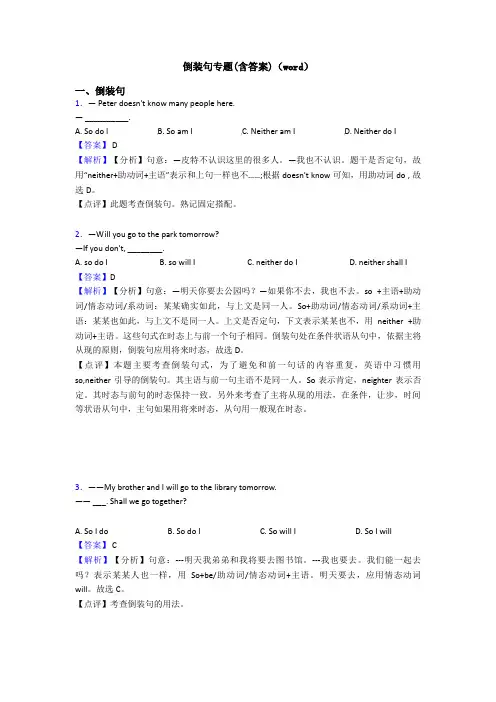
倒装句专题(含答案)(word)一、倒装句1.— Peter doesn't know many people here.— __________.A. So do IB. So am IC. Neither am ID. Neither do I【答案】 D【解析】【分析】句意:—皮特不认识这里的很多人。
—我也不认识。
题干是否定句,故用“neither+助动词+主语”表示和上句一样也不……;根据doesn't know 可知,用助动词do , 故选D。
【点评】此题考查倒装句。
熟记固定搭配。
2.—Will you go to the park tomorrow?—If you don't, ________.A. so do IB. so will IC. neither do ID. neither shall I 【答案】D【解析】【分析】句意:—明天你要去公园吗?—如果你不去,我也不去。
so +主语+助动词/情态动词/系动词:某某确实如此,与上文是同一人。
So+助动词/情态动词/系动词+主语:某某也如此,与上文不是同一人。
上文是否定句,下文表示某某也不,用neither +助动词+主语。
这些句式在时态上与前一个句子相同。
倒装句处在条件状语从句中,依据主将从现的原则,倒装句应用将来时态,故选D。
【点评】本题主要考查倒装句式,为了避免和前一句话的内容重复,英语中习惯用so,neither引导的倒装句。
其主语与前一句主语不是同一人。
So表示肯定,neighter表示否定。
其时态与前句的时态保持一致。
另外来考查了主将从现的用法,在条件,让步,时间等状语从句中,主句如果用将来时态,从句用一般现在时态。
3.——My brother and I will go to the library tomorrow.—— ___. Shall we go together?A. So I doB. So do IC. So will ID. So I will【答案】 C【解析】【分析】句意:---明天我弟弟和我将要去图书馆。
高考英语倒装句练习题30题含答案解析1.Never have I seen such a beautiful sunset.Not only have I read this book, but also I have recommended it to my friends.Hardly had I arrived home when it started to rain.Seldom does he go to the movies.Little did she know what was going to happen.Nowhere can you find a better place to relax.At no time should we give up.By no means is he a bad person.In no way can we accept this proposal.Under no circumstances will I betray my country.答案解析:1.以否定副词never 开头,句子要用部分倒装,把助动词have 提到主语I 前面。
在高考中,这种倒装句常出现在阅读理解和写作中,以增加句子的表现力。
本题中其他选项没有倒装,不符合语法要求。
2.以not only...but also...连接的句子,当not only 位于句首时,前半句要用部分倒装,把助动词have 提到主语I 前面。
3.以hardly...when...引导的句子,hardly 位于句首时,句子要用部分倒装,把助动词had 提到主语I 前面。
4.以seldom 开头,句子要用部分倒装,把助动词does 提到主语he 前面。
5.以little 开头,句子要用部分倒装,把助动词did 提到主语she 前面。
6.以nowhere 开头,句子要用部分倒装,把情态动词can 提到主语you 前面。
倒装句完成句子专练(附完整答案)[高考回顾】Not only______(给予帮助)people to find jobs, but also medical treatment will be provided for people who need it(help).答案:will help be given to.1.Not until she had supper,______________ (她妈妈才回家)。
(come)2.______________(尽管她累了),she helped her mother to do the housework.(as)3.Should______________(你被开除),your health care and other benefits would not be immediately cut off.(fire).4.Never in my wildest dreams (我能想像)these people are living in such poor conditions.(imagine)5.Only with the help of the local guide______________ (那些登山者获救了)(rescue)6.Greatly loved in China______________(是英国浪漫诗人)(poet)7.So (我觉得难)to work out the problem that I decided to ask Tom for advice. (find)8.______________ (尽管他是个教师),he wasn’t able to educate his own child well.(as)9.I’ve tried very hard to improve my English, but by no means(老师对我的进步满意)。
完整版)倒装句高考练习题及答案1.Only when you have obtained sufficient data can you come to a sound n.2.Little did he know that this n was so rich in natural resources.3.Alfred E。
Smith XXX office after his 1928 XXX.4.Only in recent years have people begun to realize that wild dogs。
XXX。
often do more good than harm.e what may。
we were not going to make any XXX.6.His head turned only when I shouted at the top of my voice.18.If he had taken a little more time to think。
he might have XXX.19.XXX。
upon which our life depends for food and clothing.20.Not until the beginning of the 19th century did scientists know that all matter is made up of atoms.21.Hardly had he got out of the court when the reporters XXX.22.Among XXX.23.Nowhere are ns to computer technology confined to any one country。
this is more true than in XXX.31.XXX not once did his view of life change.32.It is not true that all English people know their own language well.33.The molecules of XXX.34.So are the death rates。
英语倒装练习题及答案解析1.So badly _____ that he could not speak his lines without coughing.A. did he affectB. was he affectedC. he affectedD. he was affected答案:B解析:译文:他感染得太严重了,以致说话都不得不咳嗽。
本题考查部分倒装。
so+ adj./adv.位于句首时,句子需要部分倒装,排除C、D;主语“他”是被感染,需要用被动语态。
故选B。
2.Seldom _____ my manager in such good mood since I worked in this company.A. do I seeB. I have seenC. have I seenD. I saw答案:C解析:译文:自从我来公司工作,就很少见到我的经理心情这么好过。
本题考查部分倒装。
seldom是否定副词,位于句首时,句子需要部分倒装,排除B、D;时间状语“since…did”与现在完成时连用。
故选C。
3._____ her new dress in front of the mirror.A. On wentB. Went onC. Did go onD. Does答案:A解析:译文:她在镜子前穿上了新裙子。
本题考查全部倒装。
B、C、D选项没有倒装的关键词位于句首,不需要倒装;而A选项on位于句首,句子需要全部倒装。
故选A。
4._____ the last flight. You have to stay here for another night.A. There comesB. Here wasC. There goesD. It comes答案:C解析:译文:最后一班航班飞走了,你不得不在这里再待一晚上了。
本题考查全部倒装。
根据句意,最后一班航班不是来了,而是走了,要用go表达,故选C。
倒装句句型转变1 ・ You will see so many seals only at a stadium in Beijing. (Only.. J 2・ He only then became aware (意识到)of the dangers of the jungle. (Only then…) 3・ You will be able to write a good report only after you have acquired the information you need. (Only after…)4,1have seldom seen a situation (情况)which made me so angry. (Seldom…) 5・ He gave a loi of presents to his friends, but he has never given one to me. (Never...) 6・ We little realized (he dangers that were awaiting us. (Little..) 7・ She is not only good at languages, but also at history and geography. (Not only...) & They not only took care of me. but (they) also treated me as if I were their own daughter. {Not only ..) 9・ His price was so unreasonable that everybody was surprised. (So unreasonable…)10.1was so scared that I could not even scream. (So scared...) 11 ・ We have so much work to do that we have no time to relax. (So much work ..) 12・ He didn't go to bed until 12 o'clock last night, (Not until..,) 13. He won't go to bed until she returns home, (Not until…)14,1had no sooner entered home than the bell rang. (No sooner…)15,1had hardly entered home when the bell rang. (Hardly…)16.If you were to buy a new car which of these would you choose? (Were…)17,If my parents should need me, I will never lei them down. (Should…)18.If I had told him the truth, he would have been angry. (Had...) 19. Though she is pretty, she is not clever. (Pretty . . .) 20・ Though his idea might sound strange, it was accepted by the people at the meeting. (Strange …)翻译下列句子。
倒装句知识点总结(word)一、倒装句1.—More and more people prefer to walk rather than ride in cars.—________. Walking is good for health.A. So they areB. So are theyC. So they doD. So do they【答案】 C【解析】【分析】句意:——越来越多的人比起开车更喜欢走路。
——确实如此,走路对健康有好处。
A他们也是,B是啊,C是啊,D他们也是。
根据 Walking is good for health,可知表示确实是这样,起强调作用,用so+主语+助动词,因此排除B和D;再根据谓语prefer,实义动词,和主语people可知,应用助动词do,故选C。
【点评】考查倒装句,注意理解倒装句so do they和陈述句so they do的意义及用法区别。
2.—Will you go to the park tomorrow?—If you don't, ________.A. so do IB. so will IC. neither do ID. neither shall I 【答案】D【解析】【分析】句意:—明天你要去公园吗?—如果你不去,我也不去。
so +主语+助动词/情态动词/系动词:某某确实如此,与上文是同一人。
So+助动词/情态动词/系动词+主语:某某也如此,与上文不是同一人。
上文是否定句,下文表示某某也不,用neither +助动词+主语。
这些句式在时态上与前一个句子相同。
倒装句处在条件状语从句中,依据主将从现的原则,倒装句应用将来时态,故选D。
【点评】本题主要考查倒装句式,为了避免和前一句话的内容重复,英语中习惯用so,neither引导的倒装句。
其主语与前一句主语不是同一人。
So表示肯定,neighter表示否定。
其时态与前句的时态保持一致。
倒装句经典例题(word)一、倒装句1.My sister went to the cinema, and _________________.A. so did IB. so have IC. neither did ID. neither have I【答案】 A【解析】【分析】句意:我姐姐去看电影了,我也是。
went是一般过去时,助动词是did,故排除B和D选项,省略句,so+助动词+主语,用于肯定句,……也是,neither+助动词+主语,用于否定句,……也是,根据My sister went to the cinema,可知是肯定句,故选A。
【点评】考查省略句,注意so+助动词+主语的用法。
2.一 I didn't watch the football match on TV yesterday.一 . I got home too late to watch it.A. So did IB. Neither did IC. So I didD. Neither I did【答案】 B【解析】【分析】neither/nor+助动词+主语,译为“某人(物)也不……”,如果上句是否定句,那么下句就是也不是这种情况;so+助动词+主语,意为“某人(物)也是……”如果上句是肯定句,那么下句就是也是这种情况。
用于这种结构的主语是不同的人,如果是上下的两句的主语是同一个人,则用半倒装结构,so+主语+助动词,表示“某人的确是这样”。
句意:—我没看昨天的聊天节目,—我也没看,我到家太晚而没有看。
结合句意,故选B。
3.—I've finished my homework, Tony.—_______.A. So have IB. So I haveC. So did ID. So I did【答案】 A【解析】【分析】句意:托尼,我已经完成了我的作业。
——我也是。
So +助动词+主语,表示同样,也;So+主语+助动词,表示的确,确实。
结合句意,表示也做完了,故排除BD 两项。
根据I've 可知此处的助动词是have, 故选A。
【点评】考查倒装句的用法。
4.— Jim enjoys listening to pop music.— _______________.A. So does Helen.B. Also is HelenC. Helen likes alsoD. So Helen does【答案】 A【解析】【分析】“so+助动词(情态动词或连系动词)+另一主语”,此句型是主谓倒装结构,可以表示前面的情况也适用于后者,使用该句型需要注意以几个方面的问题:1.该句型只能用于肯定句,不能用于否定句:如果前句是否定句,则要用“neither /nor +助动词+主语”。
2.句型中的主语与上文中的主语是不同的两个主语3.句型中助动词,包括连系动词和情态动词的时态要和上句中谓语动词的时态相一致。
根据上文,吉姆喜欢听流行音乐。
可知选A最符合语境,海伦也是。
【点评】考查倒装句。
5.-- He swam in the river this summer.-- ________A. So did he.B. So she did.C. So did she.【答案】 C【解析】【分析】“so+助动词(情态动词或连系动词)+另一主语”,此句型是主谓倒装结构,可以表示前面的情况也适用于后者,使用该句型需要注意以几个方面的问题:1.该句型只能用于肯定句,不能用于否定句:如果前句是否定句,则要用“neither /nor +助动词+主语”。
2.句型中的主语与上文中的主语是不同的两个主语3.句型中助动词,包括连系动词和情态动词的时态要和上句中谓语动词的时态相一致。
句意:这个夏天,他在这条河中游泳了。
她也游泳了。
结合语境可知前文情况也适用于后者,故用主谓倒装结构,选C。
【点评】这几个倒装句的区别比较难。
“so+助动词(情态动词或连系动词)+另一主语”,表示前面的情况也适用于后者。
So+主语+助动词(情态动词或连系动词)是对上文所说的情况加以肯定。
如果上文是否定形式则要将so换成neither。
6.—I haven't seen the interesting movie Let the Bullet(子弹)Fly.— _________.A. Neither have IB. So have IC. Neither I haveD. So I have【答案】 A【解析】【分析】 Neither have I我也没有;So have I我也一样;Neither I have我确实不;So I have确实是这样。
句意:我没有见过这不有趣的电影《让子弹飞》。
根据语境可知选A。
【点评】这几个倒装句的区别比较难。
“so+助动词(情态动词或连系动词)+另一主语”,此句型是主谓倒装结构,可以表示前面的情况也适用于后者,使用该句型需要注意以几个方面的问题:1.该句型只能用于肯定句,不能用于否定句:如果前句是否定句,则要用“neither /nor +助动词+主语”。
2.句型中的主语与上文中的主语是不同的两个主语3.句型中助动词,包括连系动词和情态动词的时态要和上句中谓语动词的时态相一致。
另一句型so+主语+助动词是指对上文的肯定,起加强作用。
7.—Lily doesn't go to the museum this weekend. What about you, Millie?—If Lily doesn't go there, ____.A. so do IB. so will IC. neither do ID. neither will I【答案】 D【解析】【分析】句意:——莉莉这个周末不去博物馆。
你呢,米莉?——如果莉莉不去那儿,我也不去。
So+助动词+主语,表示主语也是;neither+助动词+主语,表示主语也不是这样。
根据if从句是一般现在时,主句用一般将来时。
主句是否定结构,可知此处倒装结构用neither或nor引导,故选D。
【点评】考查倒装句。
掌握so和neither引导的倒装结构的区别。
8.—Jane can speak Chinese well now.—___and ___.A. So she can, so you canB. So she is, so are youC. So she can, so can you【答案】 C【解析】【分析】句意:——简现在能把汉语说得很好。
——确实如此,而且你也说得好。
考查so引导的强调句及倒装句的用法。
A.(她)的确如此,(你)的确如此。
B. (她)的确如此,你也是。
C. (她)的确如此,你也能。
“so+主语+系动词/助动词/情态动词”表示说话者对前句所提到的情况或事实表示赞同,意为“的确如此。
” “so+系动词/助动词/情态动词+(另一)主语”表示前句所述(肯定)情况也适用于另一主语,意为“……也如此。
”根据语境可知,题干要表达“(她)的确如此,而且你也能(说得好)”,所以可排除A项。
再因,前句包含情态动词can,所以倒装句也应用can,所以排除B项。
故答案选C。
【点评】考查强调句和倒装句的用法。
注意识记:So +主谓和So+谓主。
9.Only _________ save his life.A. can the doctorB. the doctor canC. will the doctorD. could the doctor【答案】 B【解析】【分析】句意:只有医生能挽救他的生命。
分析:only的倒装中一定注意他的用法,只有当only+状语(从句)至句首是才倒装这儿很明显是在强调主语doctor所以不用倒装,故选B【点评】倒装句的用法。
10.Only in this place ________ such beautiful water and mountains.A. we can findB. can we findC. we foundD. found we【答案】 B【解析】【分析】句意:只有在这个地方我们可以找到如此美丽的水和山。
only+状语(介词短语)位于句首,其后要部分倒装,故把情态动词后助动词放在主语前,情态动词+主语+谓语的语序,故选B。
【点评】考查倒装句,注意only+状语(介词短语)位于句首,其后要部分倒装的用法。
11.— I have never visited a paper factory.— .A. So have IB. I haven't nowC. Neither have I【答案】 C【解析】【分析】句意:-我从来没有参观过造纸厂。
-我也没去过。
根据句意可知这里表示的是否定的意思,故A可以先排除,因为so 的这个倒装的用法只能用在肯定句中,表示上面所说的情况也适用于另外一人。
在否定句应该用neither,当neither 位于句首时,应该用倒装的结构。
故选C。
【点评】考查倒装。
12.— I have changed my job.— __________________.A. So do IB. So have IC. So I doD. So I have【答案】 B【解析】【分析】句意:——我已经换了工作。
——我也是。
根据时态是现在完成时故助动词是have,故排除A和C选项,so+助动词+主语,……也是,so+主语+助动词,的确是,此处表示我也是,故选B。
【点评】考查省略句,注意so+助动词+主语的用法。
13.—We are not allowed to bring any snacks or drinks at the school meeting.— .A. Neither are weB. Neither do weC. So are weD. So do we【答案】 A【解析】【分析】句意:—我们在学校会议上不被允许带任何零食和饮料。
—我们也是。
根据We are not allowed可知此处表示否定,并且助动词用are,故表示我们也不被允许,用Neither are we。
故选A。
【点评】表示与前面肯定句的情况一样,用句型So+助动词+主语。
表示与前面否定句的情况一样,用句型Neither +助动词+主语。
助动词与前一句的助动词一致。
14.—I didn't go to the cinema yesterday. What about you?—____________, because I was preparing for the project all the time.A. Nor do IB. Neither did IC. Neither am ID. Nor was I【答案】 B【解析】【分析】句意:—我昨天没有去电影院,你的?—我也没去,因为我一直在准备这个项目。